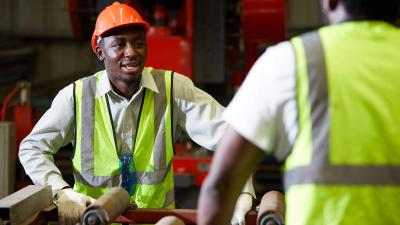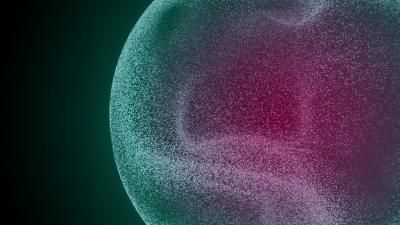
Engineering X grants £1mil to improve engineering education
Engineering X gives £1 million worth of grants to projects across 14 countries to boost the quality of engineering education and training.
Global perspectives on communicating science and data through creativity.

This event starts on
ArtScience Museum, Singapore
Conference
A free hybrid symposium hosted by Lloyd’s Register Foundation, in partnership with ArtScience Museum of Singapore and the Institute for the Public Understanding of Risk at the National University of Singapore (NUS), exploring global perspectives on communicating science, data, and complexity through creativity.
The symposium is aimed at practitioners involved in communicating science and data through art and brings together a broad community of people from different disciplines, sectors, and perspectives to share their experiences, learning, and ideas.
Participants will include artists, designers, scientists, communicators, and public engagement professionals from around the world.
"ArtScience Museum in Singapore explores the intersection between art, science culture and technology. We believe it is in the space where these areas meet that we see new ideas and innovation. We like to say it is the place where the future is made. In this presentation, I'll talk outline why ArtScience Museum has engaged in a series of exhibitions and programmes that critically investigate the future.
It can be difficult to think about anything other than the present during a time of crisis. The Covid-19 pandemic has transformed the world. The war in Ukraine is creating new fears and anxieties globally. Climate change is getting worse. The past two years have felt like one continuous crisis, an extended fraught now. It can be hard to think beyond that grim horizon.
This talk will insist that curators who work at the confluence of the art and science must find the courage and clarity, to imagine different futures.
Drawing on examples of work produced at ArtScience Museum, I will show how art, in dialogue with science, can give the public tools to imagine the world differently, and take action to bring a better future into being."
Science Centre Singapore uses diverse communication means to make science friendly and palatable. From science dramas and musicals, art-science visualization, transmedia storytelling, hands-on mind-on activities, to physical and digital immersive experiences, we present science with sensorial and emotional considerations for our visitors and stakeholders. Some examples will be shared.
Constant news of extreme flooding, extreme heat, extreme violence feed a growing sense of a world adrift. But, hidden from the public eye, groups of people are coming together to innovate safer worlds for future generations. SAFE is a collection of ten speculative works by Superflux and collaborators offering a poetic and imaginative perspective on such large-scale engineering projects underway around the world.
A short question and answer session.
Quantitative information about risks, while potentially useful, often fails to resonate with target audiences. How to creatively engage people with patterns embedded in data? Join us to experience new ways to make data make sense through the senses, with DataSculptures from NUS-IPUR, the Red Cross, the World Bank, and beyond.
A change for delegates to discuss the day's topics over lunch.
Daybreak is a cooperative board game about stopping climate change. Designers Matt Leacock (author of Pandemic) and Matteo Menapace will share the lessons they learned from over two years of designing a playable model of the climate crisis and its systemic solutions.
As we move into the Anthropocene and the evidence of an impending ecological crisis grows in strength, Climate change remains an abstract concept to the masses. How do we imagine the intangible? In this presentation, Ong Kian Peng will present a body of works that span across art, technology, and ecology and how the notion of Oceanic Consciousness is central to his work.
How can the disciplines of partner acrobatics and aerial acrobatics (aerial silks, hoop, trapeze) be used to better communicate risks of shocks and stresses aggravated by climate change or global catastrophic events. How might such visual performances of risk and risk mitigation help inspire action to protect people and planet?
In their joint talk, Adrian George (Director, Programmes, Exhibitions & Museum Services at ArtScience Museum, Singapore) and Tilly Boleyn (Head of Curatorial at Science Gallery Melbourne) address how museums can offer welcoming and safe spaces for exploration, exchange and understanding around diverse mental health experiences through the interplay of art, science and technology.
ArtScience Museum’s Season of Mental Wellbeing – a series of exhibitions, education activities and public programmes unfolding throughout 2022 – aims to raise awareness and initiate conversations on mental health and establish the museum as a place of care and wellbeing.
Adrian and Tilly will speak about the cross-institutional collaboration on MENTAL – an exhibition which was first presented at Science Gallery Melbourne at The University of Melbourne and later staged at ArtScience Museum in Singapore as the culmination of its Season of Mental Wellbeing.
As science is about exploring the language of nature, art is about provoking the emotions of humans. Physicist and author José Ignacio Latorre will speak on the overlapping cultures of both activities: how they involve experimentation, abstraction and wonder, with examples from an artist-in-residence at Centre for Quantum Technologies.
A short question and answer session.
Why winning a film audience in the attention economy is an emotional business. A live conversation with award-winning director and filmmaker Dan McDougall.
Two Kinds of Water (22 mins)
‘Two Kinds of Water’, explores the lives of a family living in the Guet Ndar fishing community on Senegal’s north coast – a country whose name literally means ‘our boat’. The 5,500km coastline of West Africa, is home to some of the most diverse and dangerous fishing grounds in the world.
It provides a livelihood to eight million people as skills are handed down from generation to generation, yet climate change, over-fishing and contested waters are producing new and deadly threats every day.
“Two Kinds of Water” charts the unbreakable bond between a fisherman and his wife as they face unbearable challenges, fighting to keep their young family afloat in one of Africa’s most vulnerable fishing communities. A combination of deeply poetic voices and lyrical journeys vividly render the lives of ocean communities on the frontline of the climate crisis and the fishermen whose lives lay on the line each time they leave the shore.
Salt Lines (16 mins)
Searchlight (30 mins)
"The best way to find yourself is to lose yourself in the service of others."
Searchlight is an intimate triptych narrative that gets under the skin of what it is like to risk your life as an RNLI volunteer. Providing an on-call search and rescue service for the UK and Ireland, 24 hours a day, 365 days a year and the omnipresent pagers on the waistbands of this cinematic film, Leonie, Lawrie and Jasmin, represent the very embodiment of losing yourself in the service of others.
Over 320,000 people worldwide drown every year but this figure is most likely a major underestimate. As long as people and vessels are on the water search and rescue operations are needed. Yet operating conditions are increasingly challenging and SAR teams face unprecedented new risks, potential budget cuts and the influence of the climate crisis on weather patterns. What Searchlight tells us is perhaps our enduring search for balance and happiness in life should focus less on the self and more on how we can contribute to community.
Guided tours of ArtScience Museum exhibits are also available during this time:
The end of the day's activities.
Meet our Art/Science Symposium speakers.